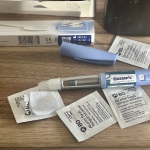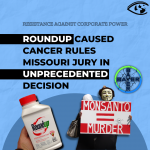US: Lobbyists Try to Insert Special Interests in Bioterrorism Bill
In the final hectic days before Congress adjourns for the year, lobbyists are swarming around the Capitol, trying to adorn a bill on bioterrorism with all sorts of special-interest provisions.
Profit-making hospitals are trying to qualify for federal disaster assistance, now available only to nonprofit groups.
Biotechnology companies want the government to protect them against lawsuits over injuries caused by use of their products.
Drug companies want an exemption from the antitrust laws so they can work together to develop, produce and sell drugs and vaccines against anthrax, smallpox and germ warfare agents.
House Republican leaders said today that the $3 billion bioterrorism bill would reach the House floor this week, perhaps on Tuesday. The Senate is expected to act on it before the end of the year.
With support from the drug and biotechnology industries, Bush administration officials are asking Congress to let them suspend drug safety and testing requirements in the event of a bioterrorist attack or other emergency to rush potential treatments to affected areas.
Lobbyists have supplied Congress with the precise legislative language they want to see written into law to favor the interests they represent.
They are focusing on members of both parties, since Republicans and Democrats have worked together in writing legislation to defend the nation against bioterrorism.
The effort has been led by two Republicans, Senator Bill Frist of Tennessee and Representative Billy Tauzin of Louisiana, and two Democrats, Senator Edward M. Kennedy of Massachusetts and Representative John D. Dingell of Michigan.
Under current law, only state and local governments, individuals and private nonprofit organizations can receive federal disaster assistance. The Federation of American Hospitals, which represents investor- owned
hospitals, wants to redefine "private nonprofit facility" to include "private for-profit medical facilities."
Charles N. Kahn III, president of the federation, said for-profit hospitals should have access to federal money because "they provide critical community services in an emergency." Dan Boston, a lobbyist for the federation, said: "Disaster strikes without regard to hospital ownership. In many markets, for- profit hospitals serve as the safety net or sole community providers."
Some state and local officials and nonprofit groups object to the change. Federal aid is limited, they say, and the people who are now eligible will receive less if for-profit hospitals get some of the money.
Moreover, some members of Congress say, if for-profit hospitals and nursing homes can qualify, then electric power companies, gas companies and other investor-owned utilities can use the same argument to insist that they too should get federal disaster assistance.
Lobbyists for Tenet Healthcare, a for-profit company, told Congress that the current ban on aid to for- profit hospitals was unfair and anticompetitive. Profit-making hospitals cannot get federal disaster aid,
Tenet said, but "their nonprofit competitors are building new hospitals with federal money -- the very taxpayer dollars that the for-profit institutions pay into the Treasury."
Biotechnology companies are lobbying Congress and the White House on another important issue in the bioterrorism bill. They want the government to defend them in court and pay claims for injuries caused by the vaccines they make to protect people against toxins and "biological agents."
"A small company can be wiped out by litigation if it is not indemnified" by the government, said Stephan A. Lawton, vice president of the Biotechnology Industry Organization.
Legislation drafted by the industry would require the government to "indemnify and defend" any federal contractor who produced drugs or vaccines to combat bioterrorism.
The biotech industry wants the government to limit its liability, just as a 1957 law, the Price-Anderson Act, limits liability for nuclear accidents resulting from the operation of nuclear power plants.
The bill drafted by biotech lobbyists would prohibit punitive damages and would set a $250,000 limit on damages for pain and suffering and other noneconomic losses, like the death of a loved one.
The industry argues that such limits on liability would encourage companies to develop vaccines and other products to combat terrorism.
Likewise, drug companies have been asking Congress for some relief from antitrust laws, to make clear that they could work together on certain projects.
Under the Frist-Kennedy bill, the Justice Department could grant drug companies an exemption from the antitrust laws so they could collaborate in the testing, manufacture and sale of drugs and vaccines needed to cope with the threat of bioterrorism.
At the same time, lobbyists are fighting over a proposal that would require makers of drugs and medical devices to put bar codes and universal product numbers on their products.
Hospital executives and federal officials say the bar codes would speed the delivery of drugs and reduce the chances that the wrong item might be dispensed. But some manufacturers of drugs and medical devices have urged Congress to reject the proposal, saying it would increase their costs and might be used by the government to set up some type of fee schedule.
Herb Kuhn, a lobbyist for Premier Inc., a group purchasing agent for nonprofit hospitals, said the bar codes would be a boon to hospitals, making it easier for them to compare the prices and effectiveness of drugs and medical devices.
Drug companies and the Bush administration have told Congress that rules of the Food and Drug Administration may interfere with the production of drugs and vaccines needed in a public health emergency. So, they say, the secretary of health and human services should be able to waive those rules to ensure that a sufficient supply of drugs will be available.
When asked for examples, administration officials said they might want to suspend rules for the testing and labeling of drugs, vaccines, blood and blood products. Also, they said, the government may want to waive quality-control standards, "good manufacturing practices" and rules that require drug makers to notify the government of any serious illness or injury caused by the use of their products.
- 122 Pharmaceuticals
- 181 Food and Agriculture



